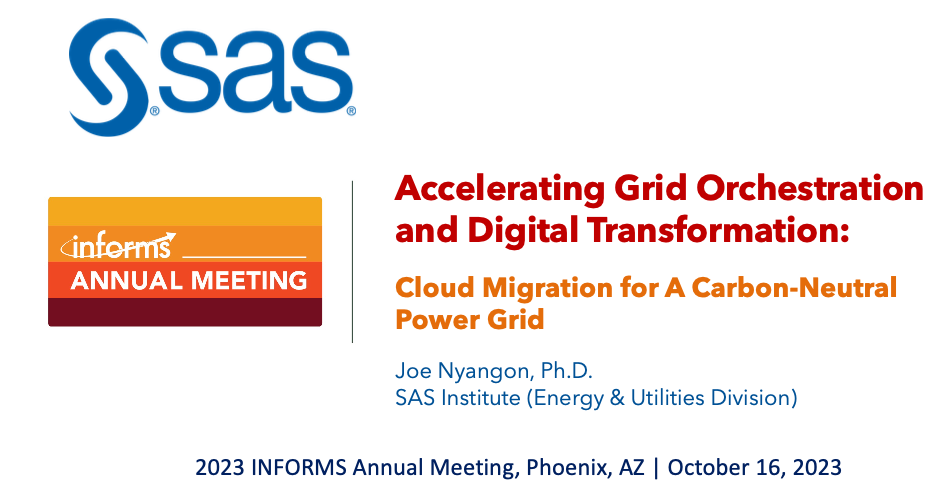At the 2023 INFORMS Annual Meeting in Phoenix, AZ, from October 14-18, Dr. Nyangon participated in a panel discussion on enhancing power grid planning and operations through grid orchestration and digital transformation during the session on “Resilience and Sustainability in Power Grid Planning and Operations.”
Presentation Abstract:
Accelerating Grid Orchestration and Digital Transformation: Cloud Migration for a Carbon-Neutral Power Grid by Joe Nyangon, Ph.D. SAS.
Accelerating grid orchestration and decarbonization is pivotal for digital transformation and modernization of power systems, and cloud migration has emerged as the catalyst for this change. This presentation delves into how cloud migration and optimization can foster this acceleration. Sustainable and financial gains depend on the provider's renewable power mix, hardware efficiency, and circular value chains. The discussion focuses on the future of cloud migration, technological innovation, and the utility industry's imperative to orchestrate a clean energy grid.
Other Panelists included:
Scenario-based Optimization Models for Power Grid Resilience Decision-making for Extreme Flood Events by Ashutosh Shukla, Erhan Kutanoglu, John Hasenbein — The University of Texas at Austin.
Extreme weather events such as hurricanes cause significant damage to the power grid. Consequently, stakeholders must evaluate and adopt mitigation measures to enhance its resilience. To help address this challenge, we present scenario-based optimization models for power grid resilience decision-making, using flooding as a motivating example. We integrate flood forecasts from a physics-based storm-surge model with a power flow model to build optimal substation hardening strategy and flood forecasts.
Integrated Planning of Hydrogen Supply Chain Network and Power System by Siqiang(George) Guo, Erhan Kutanoglu,Shadi Goodarzi — The University of Texas at Austin
Hydrogen is an important solution to decarbonize sectors such as heavy-duty transportation, industry, and utility. A comprehensive design of hydrogen supply chains (HSC) makes decisions for the production, distribution, and storage of hydrogen based on its application. Due to high diversity of choices in each of these stages, optimal HSC planning remains challenging. We formulate a model that combines capacity expansion modeling of power system and planning of HSC.
Exploring American Residential Community Distributed Energy Resource Adoption Potential by Energyshed by Eric Scheier Emergi Foundation.
Energy equity and distributed resource integration have the potential to interact positively and negatively throughout the energy transition. Here, we estimate the impact of deploying community co-located DERs within each United States electric distribution grid as measured by a number sustainability and resilience metrics alongside market values. We show which cohorts are expected to contribute to and benefit most from different energy transition pathways and demonstrate future scenarios that meet 24/7 energy needs with affordable, clean energy.

